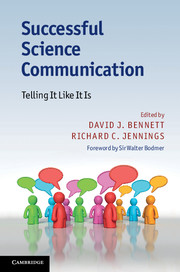Book contents
- Frontmatter
- Contents
- Foreword
- Authors' biographies
- Introduction Public engagement in an evolving science policy landscape
- Part I What it helps to know beforehand
- 1 Deficits and dialogues: science communication and the public understanding of science in the UK
- 2 Explaining the world: communicating science through the ages
- 3 Science: truth and ethics
- 4 The public's view of science
- 5 The common language of research
- 6 Not 100% sure? The ‘public’ understanding of risk
- 7 The ethos of science vs. ethics of science communication: on deficit and surplus models of science–society interaction
- Part II Policy-makers, the media and public interest organisations
- Part III What you can do and how to do it
- Part IV And finally, evaluating and embedding science communication
- Index
- Plate section
- References
6 - Not 100% sure? The ‘public’ understanding of risk
Published online by Cambridge University Press: 05 May 2013
- Frontmatter
- Contents
- Foreword
- Authors' biographies
- Introduction Public engagement in an evolving science policy landscape
- Part I What it helps to know beforehand
- 1 Deficits and dialogues: science communication and the public understanding of science in the UK
- 2 Explaining the world: communicating science through the ages
- 3 Science: truth and ethics
- 4 The public's view of science
- 5 The common language of research
- 6 Not 100% sure? The ‘public’ understanding of risk
- 7 The ethos of science vs. ethics of science communication: on deficit and surplus models of science–society interaction
- Part II Policy-makers, the media and public interest organisations
- Part III What you can do and how to do it
- Part IV And finally, evaluating and embedding science communication
- Index
- Plate section
- References
Summary
All knowledge is provisional, subject to revision in the light of new information. Knowledge is probabilistic. Some beliefs might be assigned infinitesimal probabilities – creationism and intelligent design perhaps – but all probabilities must be treated as revisable in the light of new evidence. Where knowledge (belief) relates to potential future harms or benefits, as it usually does in situations where science communication is seen as problematic or contentious, the issue can be framed as one of risk communication.
What is risk?
There are many ways in which one can categorize problems of risk and its management. Typing the single word ‘risk’ into Google produces hundreds of millions of hits. One need sample only a small fraction in order to discover unnecessary and often acrimonious arguments caused by people using the same word to refer to different things and shouting past each other. Figure 6.1 proffers a typology that has proved helpful in clearing away some unnecessary arguments.
- Type
- Chapter
- Information
- Successful Science CommunicationTelling It Like It Is, pp. 90 - 100Publisher: Cambridge University PressPrint publication year: 2011
References
- 2
- Cited by



